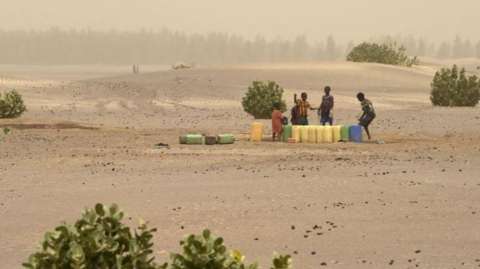Mali in West Africa is one of the poorest countries in the world. It’s also considered one of the most vulnerable to climate change.
The International Committee of the Red Cross is warning that the climate crisis is making an already dire situation there much worse – the country consists mainly of desert or semi-desert and water is becoming a dwindling precious resource.
A dry bed is what remains of Lake Faguibine. It is situated 80km (49miles) west of Timbuktu. Sand dunes have replaced the vast expanse of water and the temperature can reach 50C (122F).
With very little water left in parts of the lake, herders are losing their livestock as they travel further in search of water and food.
And with grazing land becoming scarce conflict is commonplace between the herders and farmers.
“Not a day goes by without conflict between livestock herders and farmers. There’s not much space, and everyone wants a bit of what there is,” said Mahamadou Ousmane.
With water reserves dwindling experts in the region are asking for immediate action from world leaders.
“At COP26 we call on world leaders to take concrete action, concrete engagement, to bring climate action closest to those suffering in silence, where unfortunately, and until today, the action has been underwhelming to say the least,” said Patrick Youssef of International Committee of the Red Cross.

















